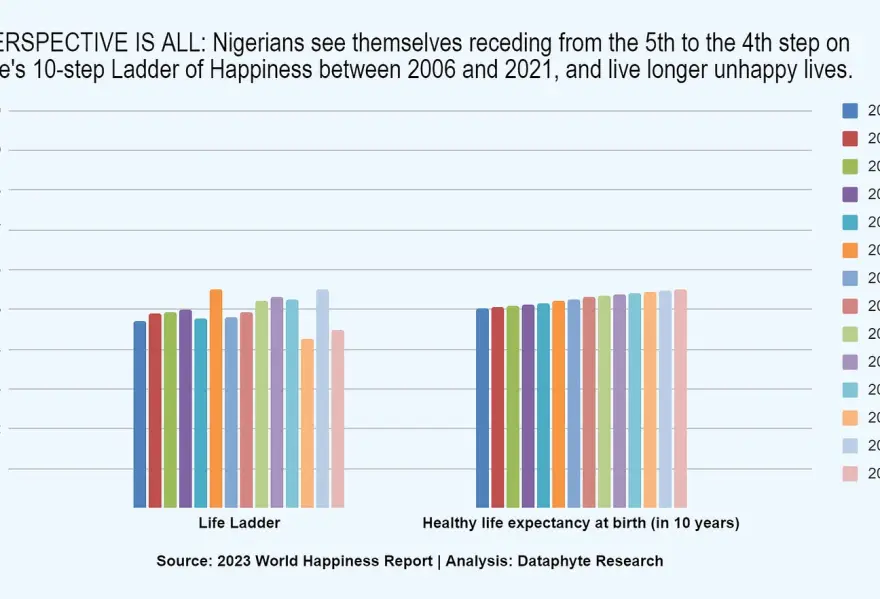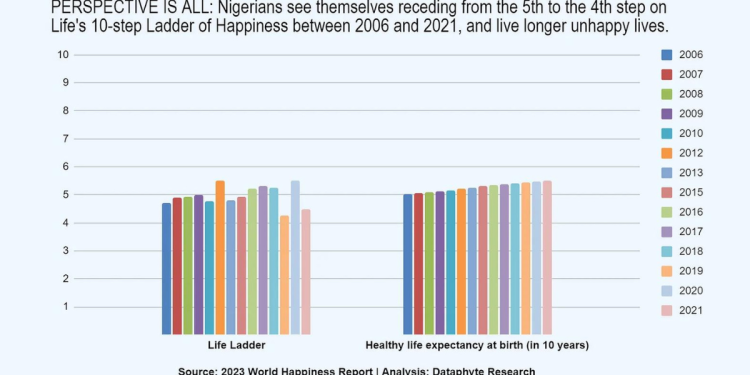“Papa Davina, also known as Teribogo, preferred to craft his own words of wisdom. Such, for instance, was his famous: “Perspective is all””.
These were the opening lines in Wole Soyinka’s latest novel, Chronicles of the Happiest People on Earth. 📖
Soyinka comically chronicled the tragic underpinnings of contemporary life in Nigeria as “art and instant history” when he mused:
“Not many nations, for instance, could boast of a Ministry of Happiness. Yet this was an innovation that came from one of the most impoverished states within that federated nation. Its pioneer minister – known as Commissioner – was the spouse of the imaginative governor, while other members of the family and relations filled the various positions generated by the unique cabinet installation.”
Outside the novel, Governor Rochas Okorocha pioneered the Ministry of Happiness and Couples Fulfillment in Nigeria and appointed his sister, Ogechi Ololo, as the Commissioner. Ms Ololo was previously her brother’s chief of staff, and his former adviser on domestic matters.
The BBC reported that the announcement was met with derision, even after the Ministry’s designation was corrected to Ministry of Happiness and Purpose Fulfillment.
It is not clear what the people derided – the imaginative governor’s quest for his people’s happiness or his preference for his sister to coordinate that public bliss.
Nonetheless, governments have a responsibility to keep their citizens happy, though they cannot determine whether every citizen will feel happy.
Nigerians see themselves on the fourth step, and just about rising to the fifth step, on life’s 10-step ladder of happiness. 🪜
With zero as the lowest place and 10 the highest level of happiness, Nigerians score themselves 4.98 in the 2023 World Happiness Report.
At 4.98, Nigeria scores below the average of 5.54, and below Bolivia, the country with the median score of 5.684
The 2023 World Happiness Report noted that “more and more people have come to believe that our success as countries should be judged by the happiness of our people. There is also a growing consensus about how happiness should be measured. This consensus means that national happiness can now become an operational objective for governments.”
Yet, it appears that governments in Nigeria and the citizenry have not reached that kind of consensus on how they measure happiness.

For instance, besides Governor Rochas Okorocha’s famous attempt at a state-led happiness endeavour, another governorship candidate for Akwa Ibom State, Umo Eno, promised a state-wide happy hour for its citizens which is centred on nothing but beer subsidies for them to relax after the day’s work.🍺
Now as the Governor-elect, Umo Eno declared that “the happy hour has began (sic)!” 🍻
Ministries of Happiness are not new. They emerged as governments began to set happiness and well-being as their key deliverables and duties to their citizens.
For instance, rather than promise beer subsidies at some happy hour to their citizens, the Ministry of Happiness in the United Arab Emirate works with the country’s National Charter for Happiness thus:
Appointing CEOs for happiness and well-being at all government bodies
Establishing councils for happiness and wellbeing at federal entities
Allocating time for happiness-related programmes and activities at the federal government
Establishing offices for happiness and wellbeing
Transforming customer service centres into customer happiness centres
Including annual indexes, surveys and reports to measure happiness in all community segments
Adoption of a standard form for corporate happiness and wellbeing at all government bodies.
In the quest for their people’s happiness 🎎, Japan and the United Kingdom also set up the Ministry of Loneliness.
“Once happiness is accepted as the goal of government, this has other profound effects on institutional practices. Health, especially mental health, assumes even more priority, as does the quality of work, family life, and community,” the 2023 Report.
Nigeria’s federal, state and local governments do not have such an organised approach to measuring and mainstreaming happiness among its citizens.
However, the 2023 Global Happiness Report notes that:
The effectiveness of the government has a major influence on human happiness of the people.
The capacity of a state can be well-measured by
its fiscal capacity (ability to raise money)
its collective capacity (ability to deliver services)
its legal capacity (rule of law)
Also crucial are
Across countries, all these five measures are well correlated with the average life satisfaction of the people.
International Perspectives
“The economics of happiness is an approach to assessing welfare which combines the techniques typically used by economists with those more commonly used by psychologists,” Carol Graham wrote in the journal of World Economics.
“It relies on surveys of the reported well-being of hundreds of thousands of individuals across countries and continents. It also relies on more expansive notions of utility than does conventional economics, highlighting the role of non-income factors that affect well-being.
“It is well suited to informing questions in areas where revealed preferences provide limited information, such as the welfare effects of inequality and of macroeconomic policies such as inflation and unemployment,” Graham remarked.
In measuring and explaining national differences in life evaluations, The 2023 Global Happiness Report relied “on three main well-being indicators: life evaluations, positive emotions, and negative emotions (described in the report as positive and negative affect).
Our happiness rankings are based on life evaluations, as the more stable measure of the quality of people’s lives.”
For Life evaluation, six variables were considered: These variables are GDP per capita, social support, healthy life expectancy, freedom, generosity, and corruption.
Continue reading



